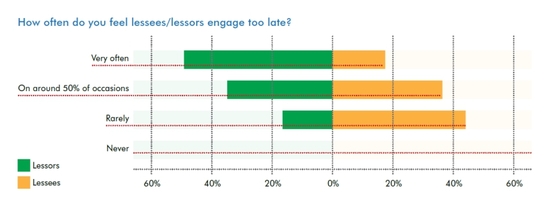- Latest edition January 8th: Outlook
- Latest edition December 11th: Year in Review
- Latest edition November 27th: Solid business in Dubai
- Latest edition November 13th: Headwinds and tailwinds
- Latest edition October 30th: Quarterly reports show strength of market
- Latest edition October 16th: ABS issuance has a strong start to Q4
|
Perception gap between lessors and lessees identified in new research by IBA
October 26th 2016: New research from aviation consultancy IBA on aircraft redeliveries highlights a large perception gap between lessors and airlines in relation to the redelivery of end of lease aircraft. The research shows that over 80 per cent of lessors thought that lessees engaged too late on at least 50 per cent of returns. The research is published in a new paper Redeliveries Revisted published by IBA.
In the paper IBA says: 'On the Working for both lessors and operators, we see and hear both sides of the relationship with respect to returns. We asked two slightly different questions:
- Lessors, how often does the lessee engage too late in the process? - Lessees, how often do you find your internal teams engaged too late in the process? But because the answers we received were a near mirror of each other, (albeit with fewer lessees responding than lessors) we thought it useful to combine on one chart.
Overall the picture, especially from the lessors’ perspective, is worrying. Over 80% of responding lessors thought that lessees engage too late on at least 50% of returns. We didn’t receive a vote for “never” from either party. As the graph shows, while one third of both groups felt engagement was too late on 50% of occasions, there are large differences of opinion on other areas. We therefore draw the conclusion that lessees remain in denial over the engagement process. The evidence is hard to challenge and the details provided above against each key area clearly provide feedback and, in our experience, there is a significant gap between expectation, desire and reality of the whole redelivery process when it comes to the lessor and lessee positions. This is not a surprise - after all this is part of the lessor’s day job but it is not part of the daily routine for an airline.' IBA are hosting a Market Update webinar on 27th October that will cover this topic as well as Brexit, the top of the market and Geographic Risk. Register here. The full white paper can be viewed here. |

